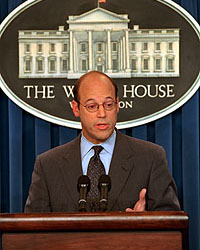A Quote by Stephen Moore
A lifetime single worker really gets a horrid deal from Social Security. The return on average is less than 0.5 percent. These workers would be nearly better off stuffing their payroll tax dollars under a mattress.
Related Quotes
According to the Tax Foundation, the average American worker works 127 days of the year just to pay his taxes. That means that government owns 36 percent of the average American's output-which is more than feudal serfs owed the robber barons. That 36 percent is more than the average American spends on food, clothing and housing. In other words, if it were not for taxes, the average American's living standard would at least double.
We were giving advice for the single-worst idea to come forward from a group that's been rife with them, it would be this: The idea is this: Let's make the tax code of America better for very rich people; let's give substantial tax relief to the richest people we can find. Forget about the person making $40,000 a year and paying Social Security payroll tax. Forget about all those other people paying income tax; we're here to give tax relief to the richest 2% of America.
First of all, the Social Security money belongs to Main Street, not to Wall Street. It needs to be said very clearly here that privatization is off the table... Social Security, as a matter of fact, is a better investment now than the stock market. There's a higher return. There's guaranteed cost-of-living increases. Privatization you have to worry about the value of your account.
Politicians like to talk about the income tax when they talk about overtaxing the rich, but the income tax is just one part of the total tax system. There are sales taxes, Medicare taxes, social security taxes, unemployment taxes, gasoline taxes, excise taxes - and when you add up all of those taxes [many of which are quite regressive], and then you look at how they affect the rich and the poor, you essentially end up with a system in which the best off 20 percent of Americans pay one percentage point more of their income than the worst off 20 percent of Americans.
If you're a poor worker - this is for new workers coming into the workplace - your benefits will increase at the current rate of increase. If you're a wealthier worker, your benefits would increase at the rate of inflation. And those changes would affect positively the unfunded liabilities inherent in Social Security.
My financial adviser Ric Edelman...thinks the time to start educating people about money is when they are children. He's set up a retirement plan called the RIC-E-Trust that can provide retirement security. A $5,000 one-time tax-deferred investment at birth, with an average interest rate of ten percent compounded, means that a child would have $2.4 million when he or she is 65 years old. Who needs Social Security with that kind of nest egg?






































